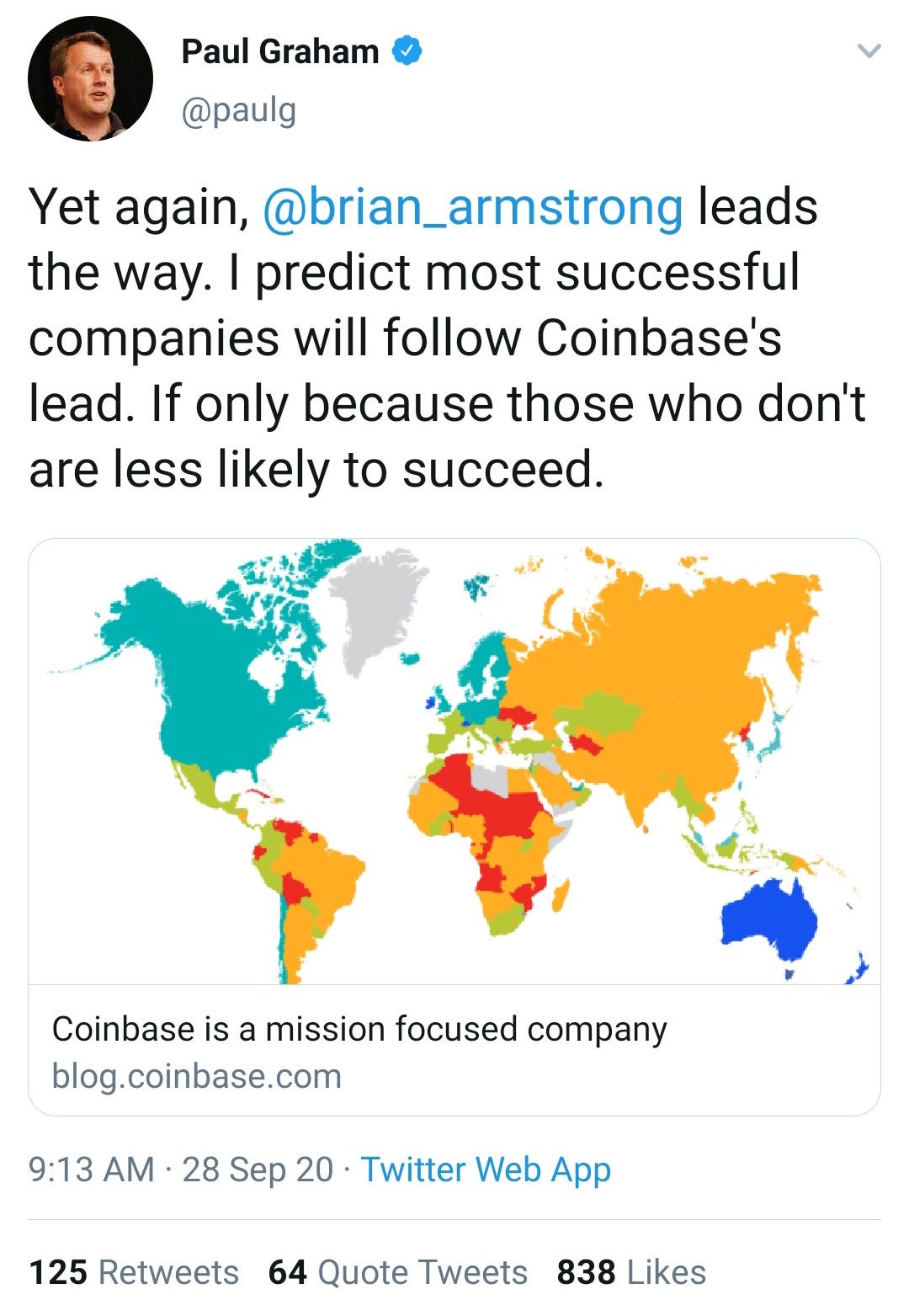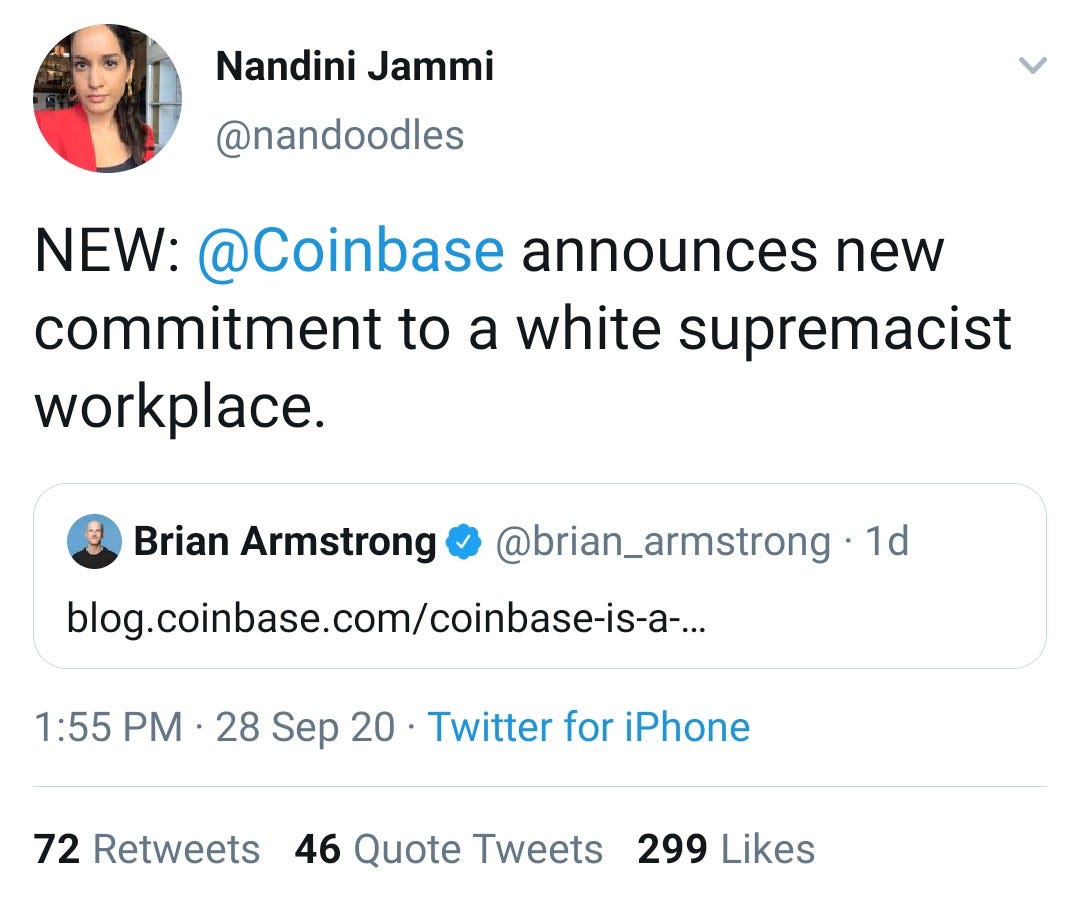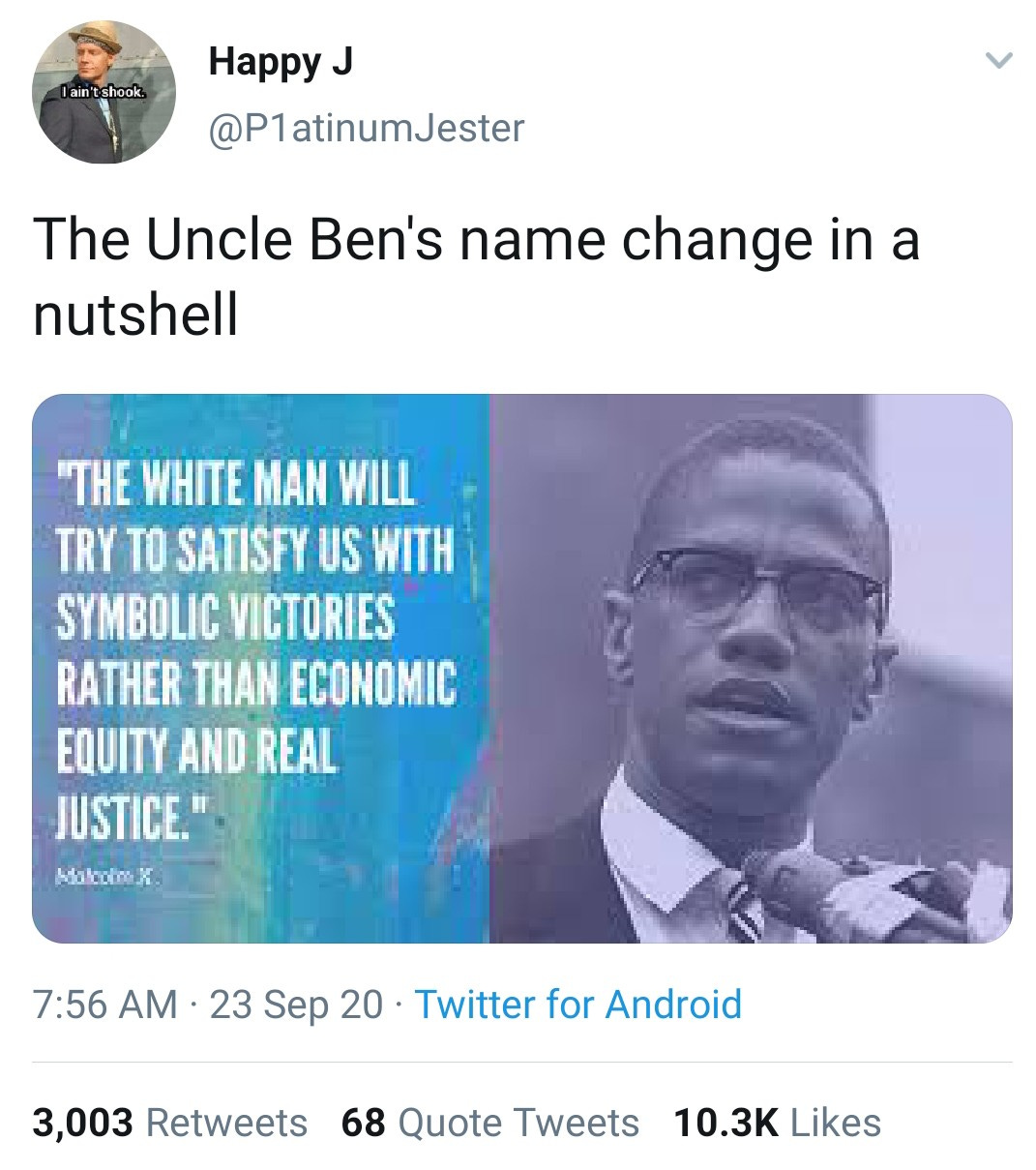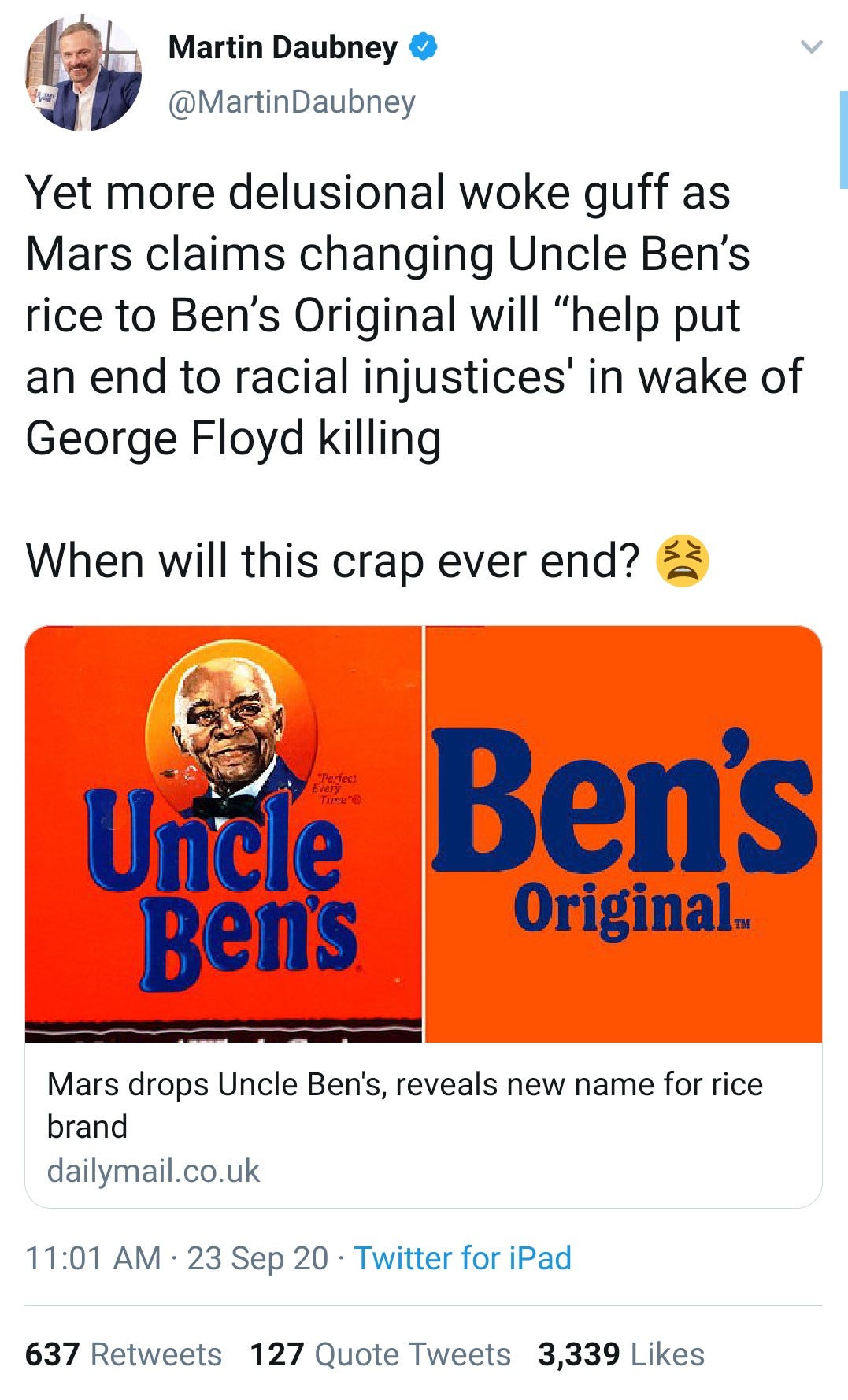The Coinbase way
Why corporate communication around major political and social events is often a lose/lose minefield, and how Coinbase is choosing a third way
Happy Monday, everyone.
Coinbase’s CEO wrote a predictably turning-out-to-be polarizing post on his company’s mission recently. His piece prompted me to think deeper about how companies communicate on broader societal and political issues in this turbulent year of 2020. Do you have to take a stance on every significant social event as a business? Does it unite or polarize your customers, employees, and other stakeholders? And is there perhaps an alternative approach?
What happened?
Coinbase is a digital cryptocurrency exchange, started in 2012. Today, it’s one of the Silicon Valley unicorns - privately owned and valued at > $8bn, headquartered in San Francisco, 1,100+ employees. The rumored upcoming IPO will allow Brian Armstrong, Coinbase’s 37-year old co-founder and CEO, to cash in on his $1bn+ stake.
On Monday, Brian’s tweet linking to his Coinbase blog post, “Coinbase is a mission-focused company,” went viral on Twitter. I mean, okay, not as viral as this 2014 Oscars selfie by Ellen DeGeneres:

But hey. Viral on tech Twitter, definitely.
Brian did get endorsements from Silicon Valley heavyweights like Paul Graham, Balaji S. Srinivasan, and quite a few others:

However, not everyone was quite as supportive:

Brian for sure expected mixed reactions - he restricted responses to his tweet to 612 people he follows and alluded to controversy in the post itself:
“I recognize that our approach is not for everyone, and may be controversial. I know that many people may not agree, and some employees may resign. I also know that some of what I’ve written above will be misinterpreted, whether accidentally or on purpose. But I believe it’s the right approach…”
What’s so polarizing about his blog post?
I would rather you read Brian’s post yourself.
Quick facts-only summary (I am trying to be as neutral as possible):
Coinbase’s mission remains to create an open financial system for the world.
The company continues building great products, teams, and making loads of money in the process. Non-profit work is a non-core effort and not a priority.
Coinbase wants to unite its employees and customers around the company mission, rather than around any societal issue or anyone’s personal beliefs.
The business will not engage in any social or political activism, as according to Brian, it almost inevitably leads to internal divisions and distractions.
The conclusions you derive from Brian’s statements will undoubtedly correlate significantly with your values and beliefs. What you think about Covid-19, US presidential elections, Black Lives Matter, California wildfires, etc. will most likely place your opinion between the two extremes. Of “This is a racist, supremacist face of greedy Silicon Valley executives” versus “It’s a rational leadership of a successful technology startup.”
Your conclusion (or mine, for this matter) is actually irrelevant here. The point is - it seems like in 2020, most of us expect any business to take some stance on every significant political and social issue there is.
Yes, and?
I mean, isn’t that the way it’s supposed to be? We’ve moved on from Wild-West Capitalism (at least, in the developed world). Businesses care about corporate social responsibility, not just profits. We are not merely talking about shareholders in analyst calls and investor presentations - it’s about a much broader base of stakeholders - employees, government, society. Every second company in the world claims to be “customer-centric” - and we, the customers, demand the answers, right? We want to know whether this particular brand of toilet paper is by any chance on the supplier list for the White House. Because look, who wants to wipe it with the same tissue Donald uses when tweeting his erratic thoughts?
Lose-Lose
Jokes aside, what’s becoming evident, though, is that taking a stance on a potentially contentious social or political issue, and communicating it, is a dangerous corporate minefield, which provides minimal upside, yet unlimited downside for the brand.
To confirm this, research any famous brand’s communications related to the Black Lives Matter movement. Customer and employee responses on social media fell into these two broad categories:
1) “This is appalling because it’s not enough” - no matter how significant the efforts of the business were in support of BLM, it would have been criticized for doing too little. Not enough money given to charitable causes, the tone too weak, inclusion and diversity efforts too slow, and so on. The thing is, for employees and customers heavily invested in any cause, the business’ effort is NEVER going to be sufficient until it matches their own drive and commitment to that same cause. Which is practically somewhat unrealistic for a large company, whose core business is far from that specific social cause that customers and employees care about.
2) “This is appalling because I disagree” - employees and customers who didn’t support or were actively opposing BLM criticized the business for its stance. I am not writing this post to exercise a moral judgment on what’s good and bad - that’s not the point. The point is, every social issue has people on both ends of the spectrum, whether these people (in my or your opinion) are right or not. LinkedIn learned it the hard way when a debate on racism back in June sparked racist comments from its employees.
Mars’ Uncle Ben’s (now Ben’s Original) is a great example. Criticized for its racially stereotypical logo, Mars dropped it several days ago in favor of Ben’s Original.
Yet, most reactions on Twitter fall very neatly into one of the above categories.
Here’s the “This is appalling because it is not enough” example - 3k retweets, 10k+ likes:

And here’s the “This is appalling because I disagree” - 600 retweets, 3k+ likes:

Obviously, I don’t know the ratio of rice consumption per like/share for either of the above tweets. The correlation of a company’s revenue and financial performance with its “social activism” and support or criticism of one or another cause merits independent research.
From an immediate communication perspective, though, it seems to me that taking a stance will inevitably leave some employees and customers unhappy, regardless of the effort.
A Third Way
I don’t know what was going through Brian Armstrong’s head when he wrote and published his post. But it seems that Brian did recognize a similar issue to the one I am describing above. When trying to rally employees and customers around a particular social issue - it turns out, you might end up dividing them even more.
I somehow doubt Coinbase’s stance on acute issues of 2020 was particularly relevant to its customers. Examples of other platform businesses like Uber, Facebook, or Amazon show that customer backlash is somewhat limited since customer benefits of platforms significantly outweigh any negative press. Does anyone still remember #deleteUber from 2017? No, didn’t think so either.
However, Coinbase’s position might be more important for its employees - especially when they see other Silicon Valley companies engaging in social activism. Which Brian acknowledges. However, he considers this activity counterproductive to the company’s core mission - which is building an open financial system (and making loads of money in the process, of course). Brian wants to focus on that mission alone - not activism, not social causes, not a political debate. And if some employees want to resign because of the direction Coinbase takes - so be it.
What’s next
Watch this space, I guess. With the (rumored) IPO coming up, it seems like Coinbase is rallying its troops around a single big goal. There definitely will be resignations - but I don’t think we will see an exodus of executives and key engineers from the company. And if there will be any - internally, those are likely to be positioned as mucking out the stalls.
For other companies, the question remains, though - can you take a stance without igniting more division and controversy?
And - will Coinbase’s third way inspire others, too?
Let’s see what answers we get in the near future.
That’s it for this week. If you liked this longread about Coinbase’s third way - feel free to hit the “Subscribe now” button below. I write about communication by top people every week.
Catch you then,
Dmytro



